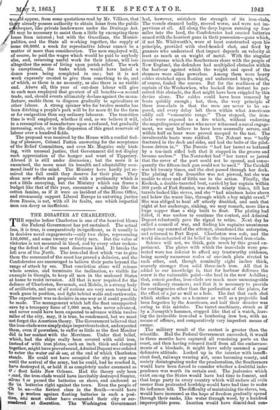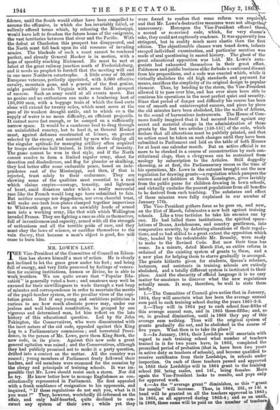THE DISASTER AT CHARLESTON.
THE repulse before Charleston is one of the heaviest blows the Federal Government has yet sustained. The actual loss, it is true, is comparatively insignificant, as it usually is in decisive naval engagements—only two ships, representing 150,000/., and some twenty or thirty men. But the value of victories is not measured in blood, and by every other reckon- ing the defeat is of the most disastrous kind. It breaks the left arm of the north. The iron-clad fleet which -vas to give them the command of the coast has proved a delusion, and the Confederates are encouraged to believe their ports beyond the range of attack by sea. That conviction alone will release whole armies, and terminate the inclination, so visible for • example in Georgia, to keep all men in the seaboard States at home to resist invasion. All that is now required for the -defence of Charleston, Savannah, and Mobile, is a strong body of artillerists, and men of all nations are very soon trained to work guns in position, and fight behind walls and earthworks. 'The experiment was as decisive in one way as it could possibly be made. The management which left the fleet unsupported -save by a trumpery force of 7,000 men, who never advanced, and never could have been expected to advance within twelve miles of the city, may, it is true, be condemned, but we must .not forget the American theory. The Government believed that the iron-dads were simply ships imperviousto shot, andexpected them, even if powerless, to suffer as little as the first Monitor -did in her contest with the Merrimac. -Under that belief, which, had the ships really been covered with solid iron, instead of with iron plates, each an inch, thick and clamped together, might have proved sound, AdmiralDupontwas ordered to enter the water cal de sac, at the end of which Charleston stands. He could not have occupied the city in any case until the arrival of the army, but he could, had he reached it, have destroyed it, or held it as completely under command as 1 fleet holds New Orleans. Had the theory only been -F fund, the iron-clads would have inevitably destroyed Sumter, -silenc 1 or passed the batteries on shore, and anchored as ;lb ',in batteries right against the town. Even the people of 'Oh ie. on—the fieriest class in the South—would have %et p warless against floating batteries in such a posi- tion, arid must either have evacuated their city or stir- astadered at discretion. The Washington Government had, however, mistaken the strength of its iron-dads, The vessels steamed badly, steered worse, and were not im- pervious at all. All along the deep lagoon running up four miles into the land, the Confederates had erected batteries armed with the heaviest guns in their possession—guns which, if not Mr. Whitworth's' were at least constructed upon his principle, provided with steel-headed shot, and fired by gunners who understood that impact depends on velocity at least as much as on weight of metal. With the singular inventiveness which the Southerners share with the people of New England, the defenders had multiplied obstacles within the harbour against which the weight and speed , of the steamers were alike powerless. Among them were heavy cables stretched upon floating and unfastened buoys, which, of course, fouled the screws. But for the readiness of the captain of the Weehawken, who backed the instant he per- ceived this obstacle, the fleet might have been crippled by this device alone. The cables could have been removed by boats quickly enough ; but, then, the very principle of these iron-clads is that the men are never to be ex- posed, and every delay left them within what Americans oddly call "concentric range." Thus stopped, the iron- clads were exposed to a fire which, without endorsing the magniloquence of men who never witnessed a naval engage- ment, we may believe to have been unusually severe, and within half an hour were proved unequal to the test. The invulnerable boats were riddled. The Nahant was " badly fractured in the deck and sides, and had the bolts of the pilot- house driven in." The Passaic " had her turret so battered by a ten-inch rifled bolt that it stopped in the groove and became useless." The Nantucket had " her turret so jarred that the cover of the port could not be opened, and conse- quently the fifteen-inch gun could not be used." The Catskill was hit twenty times, and the shot passed through her deck. The plating of the Ironsides was not pierced, but she was unable to steer and of little use in the action. Finally, the Keokuk, a double-turreted boat, carried by her captain within. 500 yards of Fort Sumter, was struck ninety times, till her turrets looked like sieves, and she " had nineteen holes above and below the water line, through which a boy might crawl." She was obliged to haul off utterly disabled, and sank that night at her anchorage, sinking, we may remark, more like a huge copper than a ship built to float. The plating had failed, it was useless to continue the contest, and Admiral Dupont reluctantly gave the signal to retire. Next day he called a council of war, and finding his captains unanimous against any renewal of the attempt, abandoned the enterprise, and returned to Port Royal. Charleston was safe, and the world disenchanted of its belief in the improvised iron-clads.
Science will not, we think, gain much by this grand ex- periment. The plates with which the iron-clads were pro- tected were too inferior to afford any trustworthy evidence, being merely numerous scales of one-inch plate riveted to each other, and, though nominally eight inches thick, scarcely stronger than solid three-inch iron. All that is added to our knowledge is, that for harbour defences the screw is the vulnerable point—the heel in the new Achilles ; that, ea-kris paribus, iron-dads are much more unmanageable than ordinary steamers ; and that it is necessary to provide for contingencies other than the perforation of the plates, for the effect of a jar as well as a hole. The fact that each shot which strikes acts as a hammer as well as a projectile had been forgotten by the Americans, and half their disaster was owing to this mistake. The turret machinery, struck as if by a Nasmyth's hammer, stopped like that of a watch, leav- ing the invincible iron-clad a lumbering iron box, with no means of offence, and comparatively very imperfect means of escape.
The military result of the contest is greater than the scientific. Had the Federal Government succeeded, it would in three months have captured all remaining ports on the coast, and then having released itself from all the embarrass- ments of a blockade, it might have safely assumed a quasi defensive attitude. Locked up in the interior with insuffi- cient food, railways wearing out, arms becoming scanty, and society disintegrating under the proclamation, the Southerners would have been forced to consider whether a doubtful inde- pendence was worth its certain cost. The jealousies which exist among the States would have had time to foment, and that large party in every country which will endure all evils sooner than protracted hardship would have had time to make its influence felt. The difficulty of maintaining the slaves, too, would have increased as the hope of freedom gradually spread through their ranks, like water through wood, by a hundred imperceptible pores. Inaction would have diminished con• fidence, until the South would either have been compelled to assume the offensive, in which she has invariably failed, or sullenly offered terms which, by releasing the Mississippi, would have left to freedom the future home of the emigrants, the vast territories between that river and the Pacific. With the defeat at Charleston this prospect has disappeared, and the North must fall back upon its old resource of invading armies. The blockade of such a coast cannot be rendered perfect, and already General Hooker is in motion, with a hope of speedily reaching Richmond. He must be met at latest at the great railway junction south of Fredericksburg, and it needs no prophet to foretell that the meeting will end in one more Northern catastrophe. A little army of 30,000 European veterans, perfectly appointed, with 5,000 effective cavalry, mountain guns, and a general of the first genius, might possibly invade Virginia with some faint prospect of success. Such an army could at all events move. But no genius and no enthusiasm can make a lumbering host of 150,000 men, with a baggage train of which the food carts alone will extend for twenty miles, which must move at the pace of its weakest draught cattle, and to which ev, n the supply of water is no mean difficulty, an efficient projectile. It cannot move fast enough, or be camped on a sufficiently narrow space. It would be a cumbrous load to drag through an uninhabited couutry, but to hurl it, as General Hooker must, against defences constructed at leisure, on ground selected by the enemy, and manned by men who display all the singular aptitude for managing artillery often acquired by troops otherwise half trained, is little short of insanity. The game cannot be won in that style, and if the North cannot resolve to form a limited regular army, shoot for desertion and disobedience, and flog for plunder or skulking, they had better offer some endurable peace, based on inde- pendence east of the Mississippi, and then, if that is rejected, trust solely to their endurance. They are showing some of the qualities most essential to a race which claims empire—courage, tenacity, and lightness of heart, amid disasters under which a really mercurial race like the French would long ago have submitted to fate. But neither courage nor doggedness, nor even cheerful trust, will make one-inch iron-plates clamped together impervious to Whitworth guns, or turn an unwieldy horde of armed men into a working army, like that with which Wellington invaded France. They are fighting a race as able as themselves, full of inventiveness and capacity, armed with all the strength of enthusiasm and all the terrible pride of race, and they must obey the laws of science, or sacrifice themselves to the vain theory, that because a man's object is good, fire will cease to burn him. - •































 Previous page
Previous page